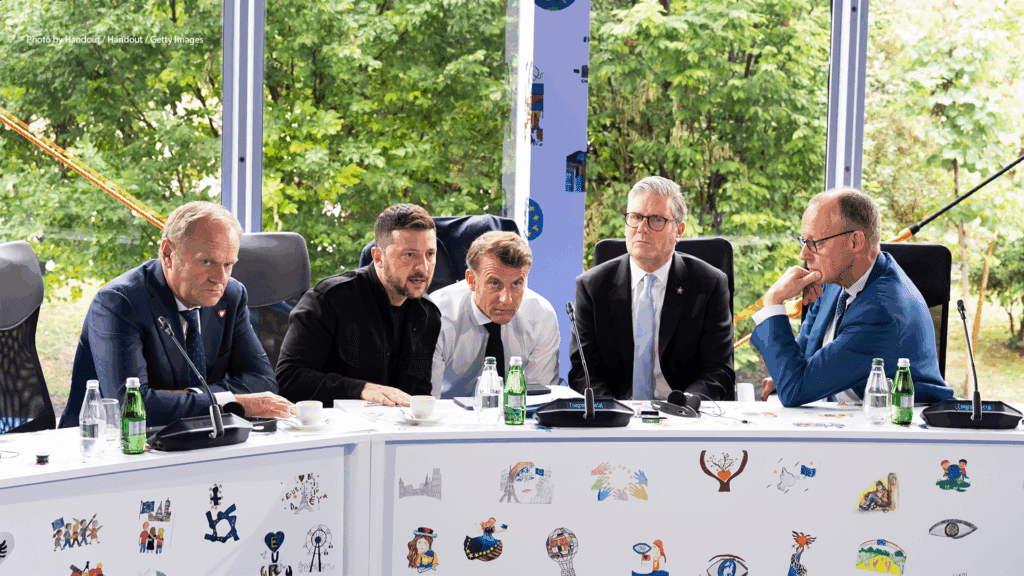Anand Menon reflects on Europe’s role in its own security and argues that it must rapidly undo the consequences of underinvestment in defence and relience on the US.
If a picture speaks a thousand words, those we saw a few weeks ago from China recount a global epic. Shots of the laughing faces of the leaders of China, Russia and India were quickly supplemented by others of Presidents Xi, Putin, Kim and Pezeshkian attending a huge military parade in the centre of Beijing. This carefully choreographed show spoke volumes about the shifts underway in world politics and the consequences of President Trump’s mercurial foreign policy.
But they revealed something else as well. What we saw in China came hard on the heels of other striking images – of Trump and Putin clasping hands in Alaska, of European leaders gathered as supplicants in the Oval Office. This is also a tale of growing European irrelevance.
It beggars belief that the Americans and Russians should be trying to solve the first large scale war on European soil since the second world war without reference to Europeans themselves. As striking is their apparent irrelevance when it comes to the other conflict occurring on their doorstep (meanwhile, the dissonance between what Europeans are willing to say and do to protect Ukrainian and Gazan citizens provides grist to the mill for critics of the west’s hypocrisy).
Yet years of naïve underinvestment in their own security, prompted by faith in an overseas protector, have left Europe powerless. Now, it finds itself not only reliant on Washington’s support for any peace keeping operation in post-conflict Ukraine, but forced to meekly submit to Trump’s decision to impose tariffs. It turns out that hard power trumps all other forms.
Turning this round will not be easy. Decades of complacency will take time to undo. But it is possible. Part of the solution lies within the European Union itself. As former Italian Prime Ministers Mario Draghi and Enrico Letta have underlined in detailed reports, moves to strengthen the single market are crucial. Crucial not only if Europeans are going to able to compete with their rivals in areas such as technology, and to generate the kind of economic growth necessary to fund their rearmament. But also, to see off populist challengers who feed off discontent and whose international links would, as Hungary and Slovakia are showing us all too clearly, undermine any notion of European solidarity.
The EU will also be important in ensuring that the significant increases in defence spending being implemented in most if not all member states are invested wisely. This means avoiding the kind of costly duplication and fragmentation that results from 27 member states each doing their own thing and supporting their own domestic industries. A degree of coordination is necessary to ensure that military capability development is done collaboratively, based on a joint assessment of common needs.
Yet the EU can only do so much. When it comes to marshalling the use of force, an institution intended to tame rather than to deploy power has its limits. The complex, consensus-dependent institutions of the Union exist for a reason, but that reason is not to make of it an effective projector of force.
So, Europeans need to think about how best to address this challenge. NATO is tried and tested, but relies on American personnel. Ad hoc collaboration between states is all well and good but does not provide the infrastructure modern defence collaboration requires.
The other dilemma is how the Union can best work with non-members. Attempting to enhance European strategic autonomy without the UK makes no sense. Yet bureaucratic rules place strict limits on how far London can work with its partners, even when it comes to developing the military capabilities they will need in the future.
Should these hurdles be overcome then Europe might – might – succeed in overcoming the chronic weaknesses it has displayed of late and wield the influence its economic heft implies.
Greater heft would facilitate a coordinated rebalancing of the transatlantic Alliance that minimises the insecurity generated by the transition. More broadly, European countries might weigh in on debates the future of global governance.
The Shanghai Cooperation Organisation meeting provided a stark reminder that the liberal international order created by the west is in the crosshairs. President Xi declared that the “house rules of a few countries should not be imposed upon others” while calling for efforts to build a “more just and balanced international governance framework.”
The west, in other words, should no longer get to run the show. Yet the world will continue to need institutions to help us address shared global challenges ranging from trade to health to the environment. A stronger and more self-confident European Union should play its part in figuring out how this new, updated system should work. This is not a task that can be left to others.
There is much to be done. Little if any of which will be easy. But it must be done, or the pictures of the future will tell a more depressing story still.
By Anand Menon, Director, UK in a Changing Europe.
